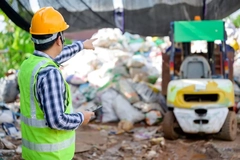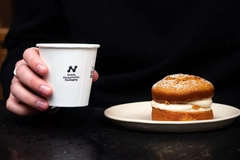Zume reinvigorates compostable packaging charge with ABB Robotics installations
19 Nov 2021 --- ABB Robotics has partnered with compostable packaging pioneer Zume to support the transition away from single-use plastic in the foodservice sector.
ABB Robotics will supply more than 1,000 robotic cells to enhance Zume’s global production of molded fiber, plant-based packaging, including up to 2,000 robots at Zume customers’ sites in the US and India over the next five years.
Zume’s packaging material is made from repurposed bamboo, wheat and straw left over from agricultural production, fully composting in less than 84 days when buried in the ground.
Commenting on how well composting infrastructure is established in Zume’s home markets, Zume CEO Alex Garden tells PackagingInsights: “Home composting and industrial composting is nascent and growing in North America, and is more well developed in Western Europe and certain Asia markets.”
According to Innova Market Insights, 21% of Indian and 23% of US consumers consider compostable packaging’s end-of-life disposal “most eco-friendly.”
 ABB Robotics will install over 1,000 molded fiber manufacturing cells, including up to 2,000 robots at Zume’s sites in India and the US.Robotic line-up
ABB Robotics will install over 1,000 molded fiber manufacturing cells, including up to 2,000 robots at Zume’s sites in India and the US.Robotic line-up
Zume products do not use coatings or adhesives in the pressing process, making them suitable for recycling and composting waste streams. “The fibers bond through a high-pressure thermoforming process,” says Garden.
Zume’s molded fiber cells are integrated with two ABB IRB 6700 robots for molding the plant-based containers. The company expects to equip its factories with up to 100 robotic cells each.
With the automation, speed and scalability provided by the molded fiber manufacturing cells, each site could potentially process 71,000 tons of agriculture material annually, producing up to an estimated two billion pieces of packaging each year.
Indian and US regulatory strides
A pilot project has been installed by Zume and ABB Robotics at Satia Industries Limited, one of India’s largest wood and agro-based paper manufacturers, creating a facility of 50 manufacturing cells processing 100 tons of wheat straw daily.
Other planned pilot installations include India-based Parason, a global pulp and paper industry supplier, and Jefferson Enterprise Energy, a fully renewable energy-powered compostable packaging factory, based in Texas, US.
Legislative tailwinds
In these two regional markets, Garden expects to see legislative tailwinds on two fronts. On the one hand, Zume anticipates legislative support to increase for composting or alternatives to landfill.
Zume products exclude coatings or adhesives in the pressing process, making them suitable for recycling and composting.“We see this driven at the municipal level through direct legislation, community action and fiscal incentives, such as municipal bonds, which are designed to move waste out of landfills and into more effective channels,” explains Garden.
On the other hand, consumers, retailers, manufacturers and governments are increasing pressure for effective plastic and expanded polystyrene foam end-of-life disposal.
“We think this increased pressure will ultimately translate to increased cost in those substrates, which we expect to further decrease their relevance.”
US Congress recently introduced the COMPOST Act, supported by compostable packaging producers such as Tipa.
In September, India became the first Asian country to launch a plastics pact, aiming to make all plastic packaging reusable or recyclable by 2030.
In other company moves, Zume secured funds to build North America’s first zero-carbon compostable packaging factory in July. Meanwhile, the company sat down with PackagingInsights to discuss the role of fiber-based alternatives in single-use packaging as the EU Single Use Plastic Directive came into force.
By Anni Schleicher










